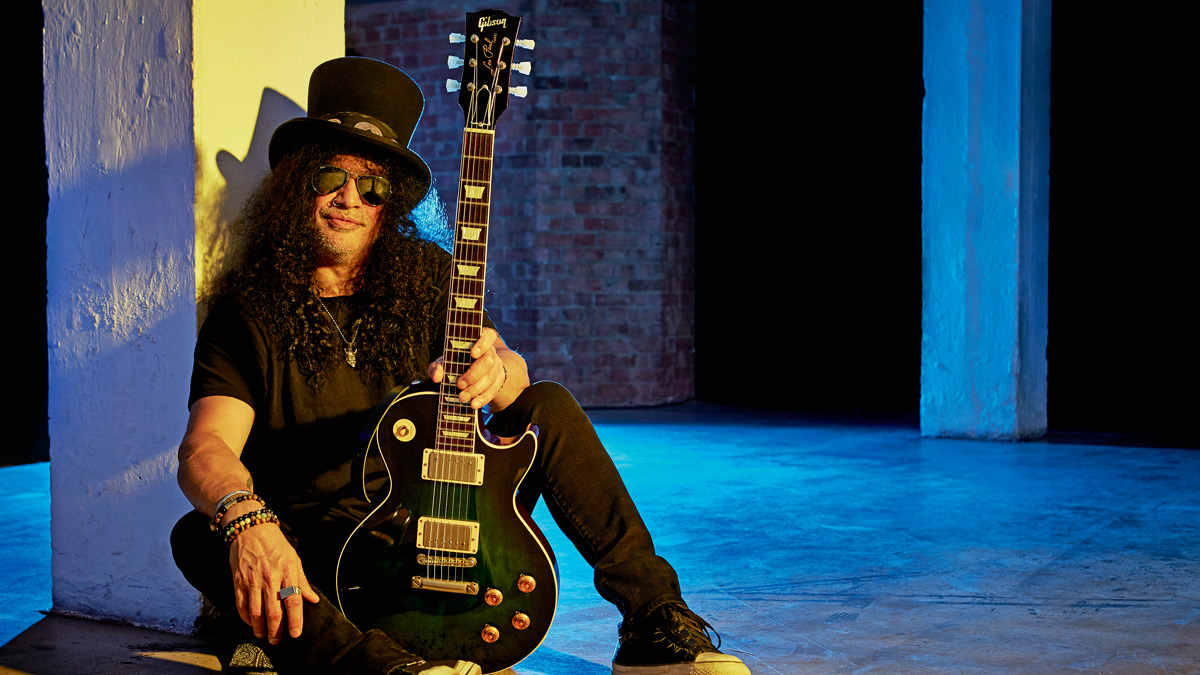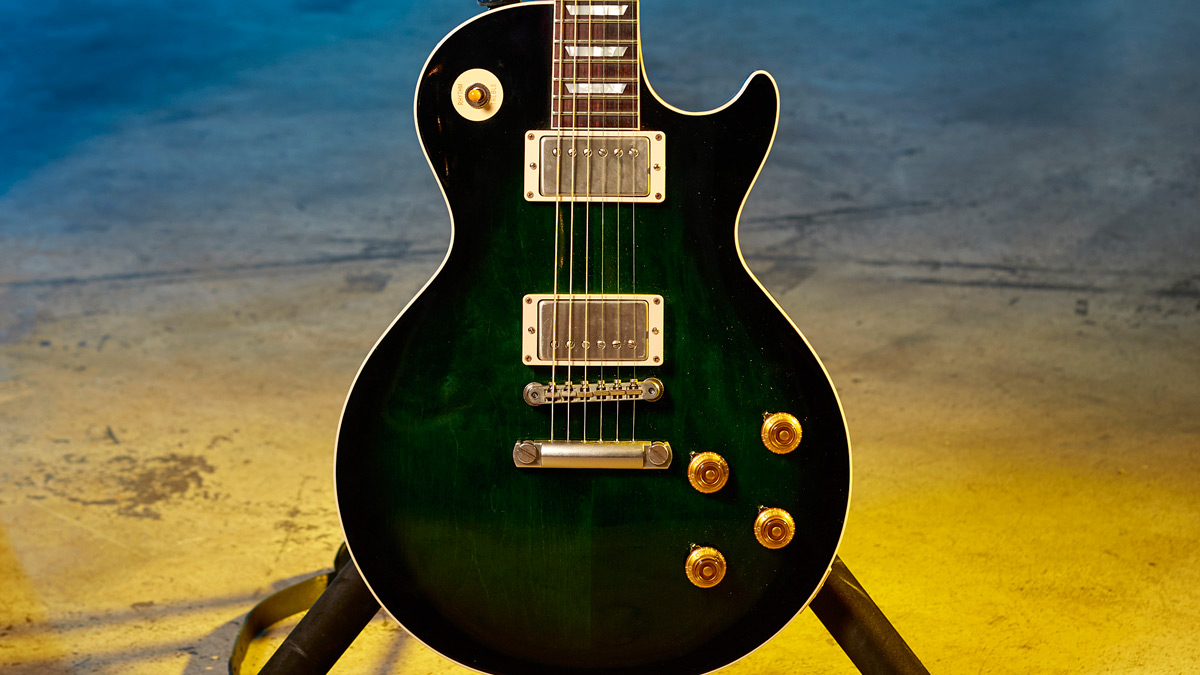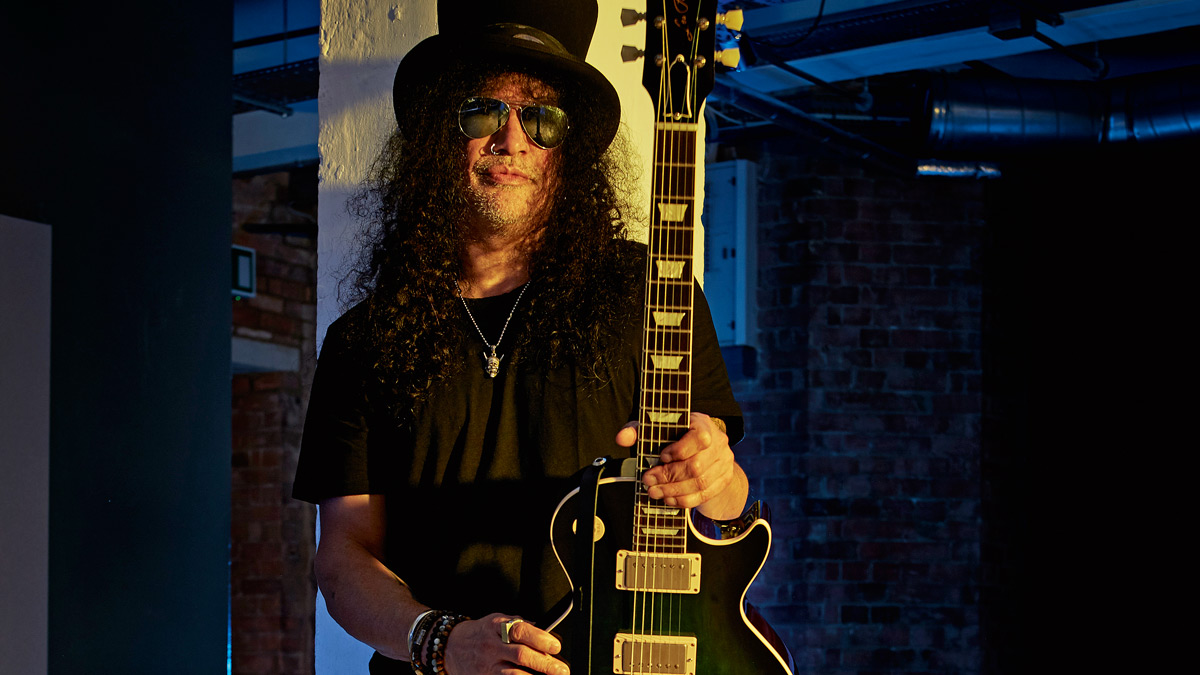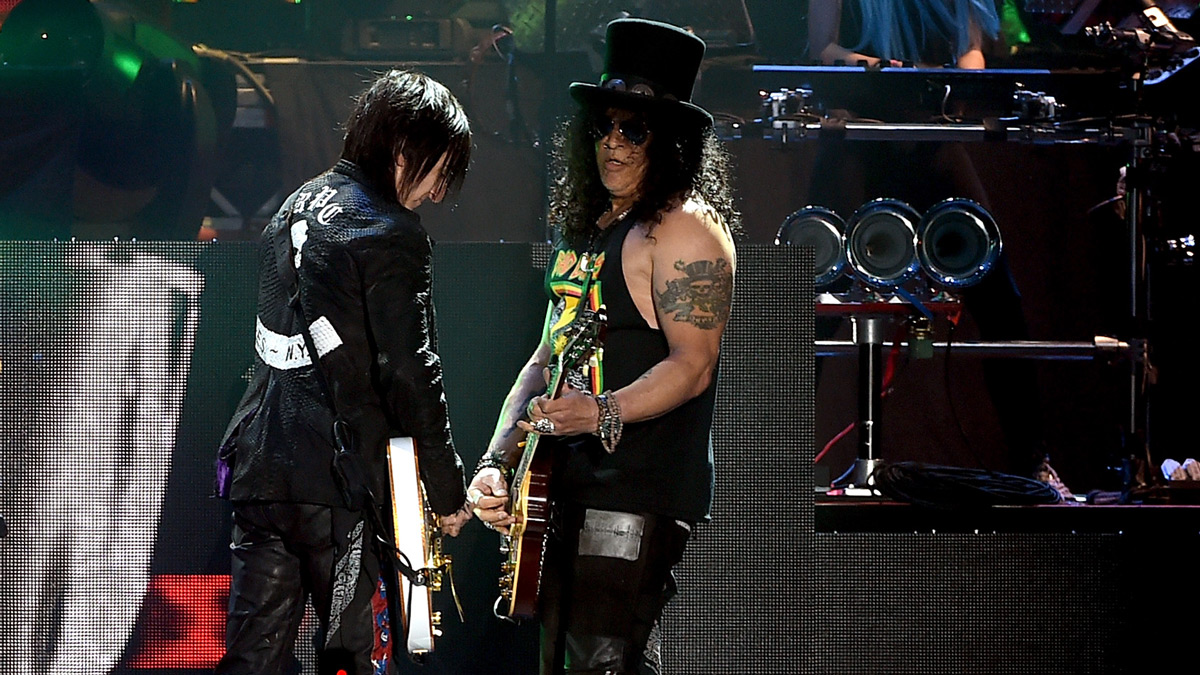Slash: "Technique can become the main aspiration, but for me, it’s more about expressing some sort of emotional content"
The guitar legend talks technique, relearning old classics and the future of Guns N' Roses

WORLD GUITAR DAY 2018: This guitar hero never rests. He’s just wrapped up another leg of Guns N’ Roses’ Not In This Lifetime tour - which has seen him reunited with singer Axl Rose for three and a half hour-long sets every night in the world’s biggest stadiums - and he’s now sat in the UK’s Gibson Guitar HQ promoting the release of his next solo album with Myles Kennedy And The Conspirators.
It’s titled Living The Dream - a sentiment that couldn’t be more apt in its summary of Slash’s life as a guitar player.
Here, the notorious cat in the hat delves deep into his most recent whirlwind years, from re-familiarising himself with his original band’s lesser-known back catalogue and analysing the secrets behind those game-changing performances to his latest body of work and beyond…
Life just doesn’t seem to stop for you. All puns aside, you’ve always stuck to your guns when it comes to gear… but is there anything new we can hear on this album - or even anything you’ve tried recently that’s blown your mind?
This whole record was done with a brand-new 100-watt Marshall Jubilee. I had a bunch of old ones, but Marshall had given me a new one and it sounded so good, I ended up using that…
“This whole record was done with a brand-new 100-watt Marshall Jubilee. I had a bunch of old ones, about seven of them, which all sounded really good and I was keen to use. But Marshall had given me a new one and it sounded so good, I ended up using that… I didn’t want to deal with all the other ones!
“That was the main amp, except for one song called The Great Pretender, which I recorded using my ’59 [Les Paul] going through an old Fender combo. My friend loaned me three because he was looking for this particular sound… I was specifically after a Fender Deluxe Twin initially, but the one I was given didn’t sound as good as this other model.
“And for guitars, I went with something a bit different to what I usually do. I used a '50s Goldtop with the soapbars in it, as well as this ’59 that I had only used once before. I also got out my ’58 and my Derrig on some songs, too, plus this really nice Tobacco Sunburst ’58 reissue I bought here in the UK after seeing pictures online. It’s been my favourite Les Paul finish since I was a kid.
Want all the hottest music and gear news, reviews, deals, features and more, direct to your inbox? Sign up here.
“There’s a reason why Tobacco Burst is my favourite finish: I remember I had this neighbour way back in the day and he had this Tobacco Sunburst Les Paul in his living room, which you could see through the big bay window at the front of the house. I would look at it every single day, even though I was only 14 and had only just started playing. To be honest, I was still a bit of a punk back then, so I would think about how I could break in there and steal it... I never did! That’s when the obsession started.”
Your love for Les Pauls seems undiminished, even after all these years…
For me, being in a room full of Les Pauls is akin to being in a room full of naked girls… it never gets old!
“I still find them tremendously sexy. For me, being in a room full of Les Pauls is akin to being in a room full of naked girls… it never gets old, haha! I don’t know what else to compare it to. These guitars are a major turn-on for me.
“I still look at the Les Paul as a particular model or style that’s the most awesome. I really don’t think there’s a better-looking or more understated-looking guitar out there. Plus, you never run out of sustain.
“Funnily enough, I was watching a thing on Mark Knopfler recently - who is an awesome player who I never really talk about - and he was in the studio having a discussion about his fingerstyle, talking about the differences between a Strat and a Les Paul. He’s one of those guys who can really make you appreciate the flavours of each type of guitar he plays.
“I definitely think the Strat is great for certain things - they’re probably the best guitars if you want to do a big variety of stuff. But Les Pauls have this certain thickness, warmth and sweetness that I just can’t get away from… They have this sound I gravitate towards, and no other guitar can compare.”

The solo in Slow Grind ends with a beautiful arpeggio that ties everything together perfectly. What’s the secret to finding a good ending to these mini ‘stories’?
“That end phrase seemed to really fit the song. Whenever I get to the solo section, I always try to stick with what I came up with spontaneously the first time round. It’s the initial ideas that tend to work for me! That escalation idea for Slow Grind just happened and I kept it.
“As you rehearse and rehearse, you keep the general idea but change little notes here and there, so by the time you go in for recording, you have a structure in place - give or take certain notes.”
The One You Loved Is Gone has a solo with some incredibly tasteful major phrases. What advice do you have for all the rock players who struggle with note choices outside of the typical minor chord movements?
“Oh God, you’re putting me on the spot - I don’t know what I’m doing half the time either, haha! The thing about playing in that kinda vibe, when it’s neither a ballad or up-tempo but more mid-tempo with major chords that have a happy feel to them, is because I still think in blues. I just don’t put the minor thirds in; I try to stick with the major. So it’s more of an old-school, 12-bar BB King feel… in my head I still see it as a blues thing.”
You’ve been playing faster than ever on the Not In This Lifetime tour. Despite being one of the most recognisable guitarists in music history, did it ever feel like you had a point to prove… as if you’re only as good as the last gig you played?
I almost had to fly by the seat of my pants and make something up while stood in front of all these people
“What’s funny is that when we were doing rehearsals, I didn’t really do anything. I didn’t have my solos mapped out because I try to stick with the live improvisations for each show. There’s a lot of stuff that’s not set in stone, so I would just play whatever. But it all came into place after that first show, where I almost had to fly by the seat of my pants and make something up while stood in front of all these people. And actually there’s an amazing amount of energy feeding back to you from audiences 80,000 strong. That’s what fuels a lot of the energy in my playing.”
You’ve been using in-ear monitors for the first time in your career. Maybe that had something to do with it, too?
“Maybe it’s the in-ears as well, because I can hear everything very fuckin’ clearly. I don’t have any effects for my in-ears, so it’s all really dry and there’s not as much sustain without live cabinets pushing air and ambience. With all that clarity, I end up playing faster than I normally would, I guess!
“I still play the blues stuff and the slow stuff fine… but there’s something about the energy that’s been making me just fuckin’ go for it and see what happens.”
Do you think you will keep the in-ears for the solo tours or other projects you might work on?
“It was mostly just for this, but then I found the positives sorta outweigh the negatives - you can go anywhere on the stage that you want; you are forced to hear every single fuckin’ thing you play whether you like it or not, there’s no escaping it.
I hate to use the word accuracy, because it’s not cool, but in-ears make you pay attention because you can hear every mistake, overbend or underbend. It makes you more accurate
“I hate to use the word accuracy, because it’s not cool, but you pay attention because you can hear every mistake, overbend or underbend. It makes you more accurate. The negatives are that in-ears don’t sound natural... they sound horrible!
“Jerry Harvey, who makes the in-ears we are currently using, saved my life because I had to use the in-ears. I didn’t have any real choice, because Axl had been working with a band using them for 15 years before I came back into it. I had to try and work with it rather than instantly walk through the door and say, ‘Nope, not doing it!’ and just start the whole thing on a negative. Now I’m thinking I will continue using them - though with live cabinets on the stage, because I’ve missed having them onstage to react with my pickups and make hundreds of little different nuances.”
Your harmonic minor runs in Double Talkin’ Jive have more in common with the flamenco masters than any kind of neoclassical Yngwie worship. Where does this influence come from and what tips can you offer players struggling with that sound?
“I look at the guitar players that are around these days, especially online, and most of them are more accomplished at all that shit than I am. So I don’t need to be giving any of these guys advice, but the one thing for me is knowing what the notes need to sound like to accomplish whatever it is I’m going for.
“I’m not thinking in technical terms, because I don’t really know it specifically; I just know this note is a half-step flat to what it would normally be. I try to know where on the neck those sounds live and from then on I just try to keep it bluesy so it still sings.
“I don’t want to just play scales or some cool arpeggiated technique that sits in an E major and F major repetition. The most important thing for me is getting away from the technical point of view and focusing on the feel or mood of what I’m trying to achieve in those phrasing combinations.”

All guitarists have a tendency to overplay - what’s remarkable about you as a guitarist is that you know when to go for it and when not...
“It’s similar to BMXing or skating or other freeform sports. I remember it was all about pure expression when I was a kid. I’d watch other people going for it and it would always be this emotional thing despite the technique and tricks involved. That concept of just going for it and doing something wild in the moment. Then the technique aspect comes in and starts to evolve and evolve… 30 or 40 years later, people will find they can do shit that’s just mind-blowing.
“Guitar playing has become like that for a lot of people, too - where it becomes about the accents to the melody or theme of a song, putting in statements that actually extenuate that idea. Suddenly, this great platform for people to express all kinds of shit becomes so technical, it gets harder and harder to explain to people. You don’t have to go there.
Art forms don’t have to be about all the cool techniques, even if they’re really, really bitchin’!
“Art forms don’t have to be about all the cool techniques, even if they’re really, really bitchin’! Someone who knows how to sweep through all the right notes can be really impressive and cool to listen to, though emotionally it won’t do much - at least not for everyone.
“Technique can become the main aspiration for people, and I don’t want to rain on their parade, but for me it’s more about expressing some sort of emotional content and finding melodies that fit the whole thing. It’s important to have that side as well as the technical side… it’s all about how you mix it all together, you know?”
You and Richard Fortus make a formidable team indeed. What is it about his playing that helps bring out the best in yours?
“Sit me down with a guitar by myself and I might not know what I’m doing or find things that will impress people. It tends to be within the context of the music I play over that allows me to go places. Richard is a really cool player in that he has this technical ability that means he can sit there with a guitar and play a lot of amazing stuff that’s still very emotive.
“It’s one of the reasons why when Guns N’ Roses started back up, I really leaned towards playing with him. Because there were a couple of other guys who used to be in the band too that were being considered, but I jammed with Richard because he was the first guy there and I knew he was fuckin’ great. He helps me out because we do a lot of soloing off each other.
“When he’s doing his own cool stuff, it pushes me into doing something different that’s the exact opposite. And vice versa, sometimes I’ll go for something really fast and he’ll do something bluesy to counteract that. It’s a good natural relationship. We never sat down to work things out; that’s generally how I like to work with other guitarists… it’s all I’ve ever done. It’s nice that we can pick off each other’s feel.”

We heard on the grapevine that you were stockpiling ideas into Guns and Conspirators folders. Clearly, it’s early days, but how is that potential new Guns stuff shaping up?
“There are a couple of ideas that I’ve earmarked for Guns that I won’t be using for anything else. But I don’t know where we are going with this; it remains to be seen what we’ll end up doing. I think the other guys would agree we’re just going to see what happens.
Now we’ve gotten past all our s**t from 20 years ago, we want to keep this thing going and keep it fresh… Should that wheel start turning, I have some cool riffs ready
“When you think about it, we’ve been working this entire time, so there’s been no chance to map out what we’ll be doing once this tour is over or what kind of approach we will take. Now we’ve gotten past all our shit from 20 years ago, we want to keep this thing going and keep it fresh and so on and so forth. Let’s see what happens! Should that wheel start turning, I have some cool riffs ready.”
How did it feel coming back to some of these songs after all these years, and what were the biggest challenges for you?
“It’s been 20 years since I’ve played some of these songs. Estranged was fun to do again. I hadn’t done that in a while! Even the material I had been playing in other bands, I had kinda adapted them to take on a unique feel in a new context. I had to reacclimatise to the whole Guns N’ Roses vibe having not done it for a while.
“I realised just how unique it is when Duff and I are playing together while Axl is singing. There’s a chemistry there that’s so powerful and on its own… after being away from it for so long, you almost forget just how massive it is. So that definitely retooled my approach to particular songs.
“There was nothing that felt daunting, but I did drive around listening to the records to remember the parts. That way, I could walk into rehearsal and people wouldn’t have to stand around while I tried to remember the fingerings, haha!
“The other side of it was figuring out what my version of The Chinese Democracy stuff would be like, because that was a whole different Guns N’ Roses animal in terms of the musicians involved. A lot of it I thought was really cool, like Buckethead did some cool shit so I would stick to that but do it in my own way so it didn’t feel too foreign or like I was squeezing a round peg into a square hole. That was interesting and fun… more fun than it was intimidating.”
On the song Better, instead of trying to play like Robin Finck trying to play like you - as per the recorded version - you chose to do your own thing…
“Some of the stuff I won’t do note-for-note because it doesn’t have a serious melodic significance to the song. It sounded like they were making it up...”
What about practice regimes, being such an accomplished...
If I go for a long time without playing, I start to feel really insecure as a guitarist
“...haha, that’s bullshit! I’m playing my guitar all the time because I’m trying to keep this shit going. I don’t know what your question was going to be, but there’s no sense of accomplishment. You have to constantly play and play; that’s the only way I can feel confident and comfortable in what I do. If I go for a long time without playing, I start to feel really insecure as a guitarist.
“When I’m on the road is when I’m happiest, because after a few weeks that’s when you start falling into a groove and can be really spontaneous, coming out with freeform shit that you simply wouldn’t have sat around jamming at home.
“It’s really been a fun run with Guns N’ Roses. Right now, I feel like there’s no limit to what I can do. We have this huge stage on which we can play for as many hours as we want - obviously, we use them all! There’s all this space to do stuff, and if you love playing guitar, getting to do that every day is just the fuckin’ best.”
What do you think are your biggest weaknesses as a guitarist?
“Playing rhythm is one of the main ones. There are specific things I practise before a show; for the first 20 minutes I won’t do anything too outrageous and just loosen up. I think it’s important to remember those techniques are a key part of what I play.
“You don’t want to be stiff when it comes to those right-hand patterns, so I might play any number of songs. Pinball Wizard is always a good one! And then for lead stuff, I might try to find things that move up and around the neck, random patterns I’ve picked up from other players that sound interesting.
“It’s about finding the things that help you do whatever it is you do before you walk out there and play. Don’t think about set rules or anything; just try to focus on your weaknesses.”
Living The Dream is out now via Snakepit/Roadrunner Records.
Join us in celebrating World Guitar Day 2018! Get playing, and share your best guitar videos, pictures, tips and stories with hashtags #WGD18 #worldguitarday
Amit has been writing for titles like Total Guitar, MusicRadar and Guitar World for over a decade and counts Richie Kotzen, Guthrie Govan and Jeff Beck among his primary influences. He's interviewed everyone from Ozzy Osbourne and Lemmy to Slash and Jimmy Page, and once even traded solos with a member of Slayer on a track released internationally. As a session guitarist, he's played alongside members of Judas Priest and Uriah Heep in London ensemble Metalworks, as well as handling lead guitars for legends like Glen Matlock (Sex Pistols, The Faces) and Stu Hamm (Steve Vai, Joe Satriani, G3).


